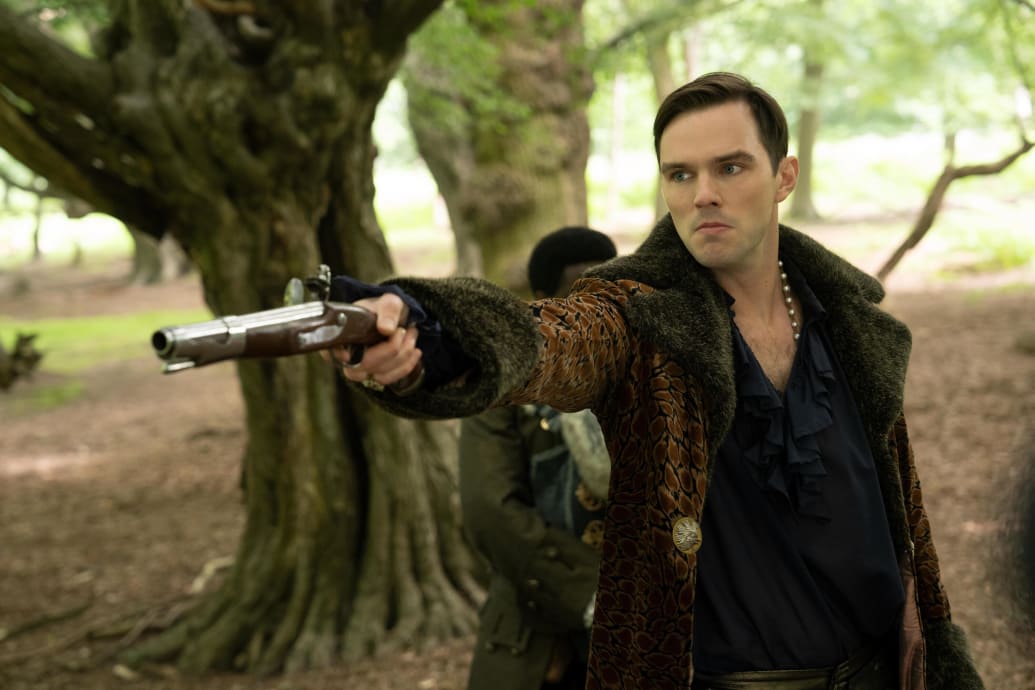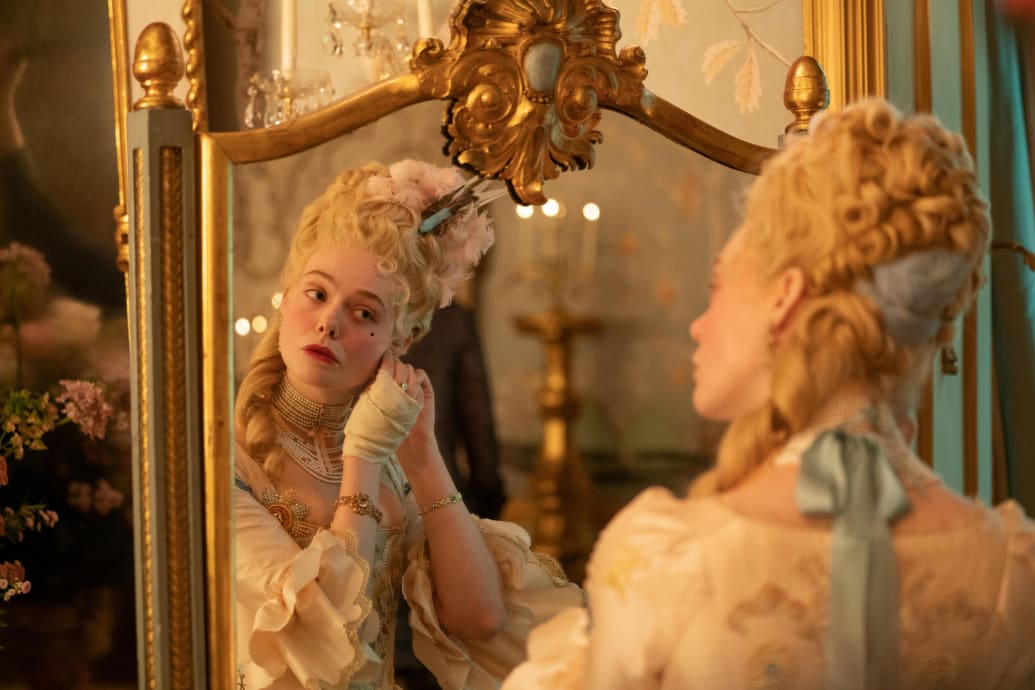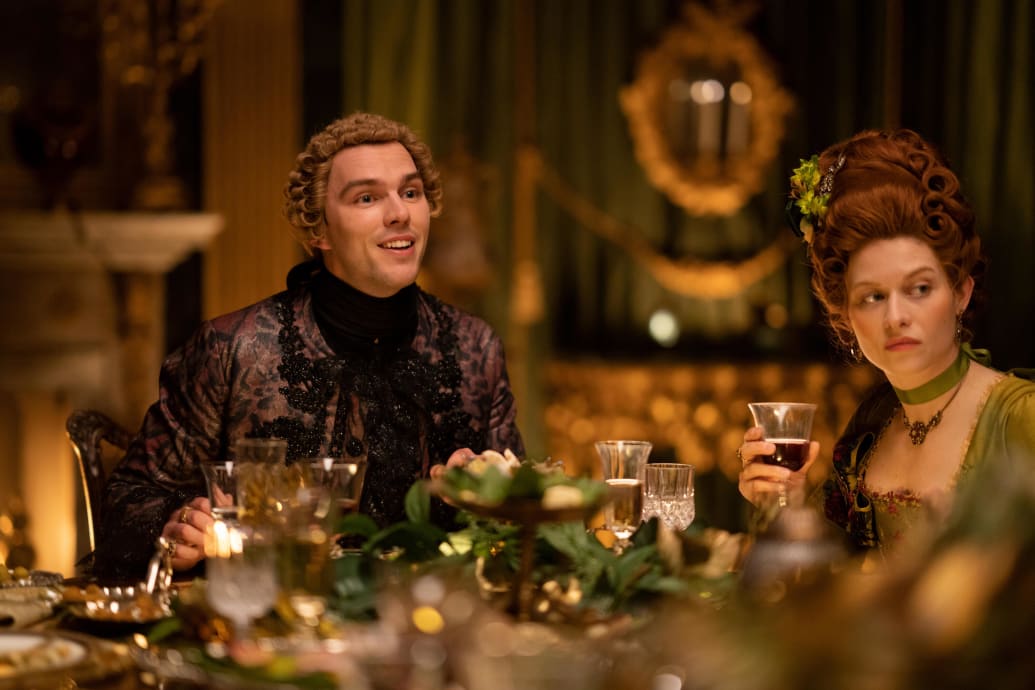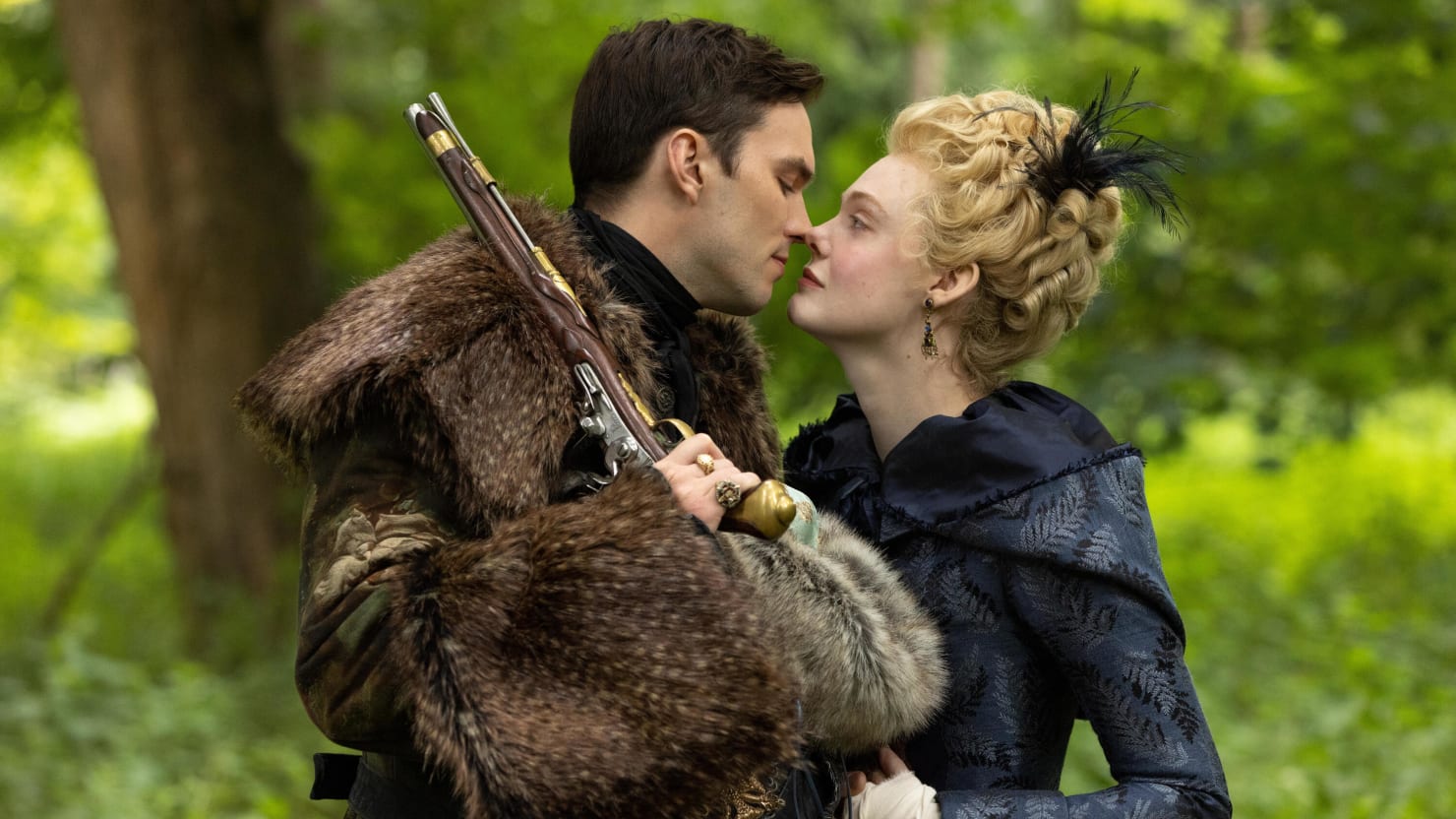Deliberately ahistorical period pieces are generally empty and useless (I’m looking your way, Bridgerton), since they obscure rather than reveal the truth about our pasts and ourselves.
Nonetheless, The Great is the exception to that reliable rule, as Tony McNamara’s manic Hulu hit employs its inaccurate vision of 18th-century Russia for delightfully daffy comedy that speaks directly to the issues at the heart of its, and our, era. It’s yesteryear reimagined as a theater of the absurd, and all the more winning for the way in which its ridiculousness is rooted in enduring personal, social, and political dynamics.
When last we left The Great, which returns May 12 on Hulu, Russian empress Catherine the Great (Elle Fanning) had just tried to kill her husband Peter III (Nicholas Hoult), only to learn that her knife had repeatedly penetrated his body double Pugachev (also Hoult)—at which point Peter had walked in on the scene and discovered his wife’s intentions.
Once again writing (or co-writing) each of Season 3’s ten episodes, whose action is infused with infectious rapid-fire wit, McNamara picks up with his protagonists as they come to grips with this awkward turn of events, which is complicated by the fact that it’s reenergized their passion for each other. Still, old wounds heal slowly, not simply when it comes to Peter’s hurt feelings over Catherine’s attempted murder, but with regards to Catherine’s still-burning fury over the act that precipitated her homicidal action: namely, Peter sleeping with her mother (Gillian Anderson), during which the matriarch accidentally fell to her death.

Christopher Raphael/Hulu
“The past must be dead or we cannot go on,” claims Catherine, and The Great is a show about the tensions between the old and the new, progress and tradition, reason and faith, and attachment to the monarchy and unequal convention. Catherine and Peter are on opposite sides of that divide, and their push-pull encapsulates the story’s underlying ideas, which also manifest themselves in Catherine’s persistent desire to bring the Enlightenment to a Russian court, whose refined airs are as over-the-top as their base impulses are primal and uninhibited.
Everyone thinks highly of themselves in this arena and yet lusts thirstily for bloodshed and sex, the twin engines and pleasures of their lives, and McNamara generates lunatic amusement from the ubiquitous juxtaposition of arrogant entitlement and sophistication, and unapologetic crassness and savagery.
As before, The Great wrestles with these concerns through a variety of plots that are twisted up in knots, beginning with Catherine’s efforts to modernize Russia by outlawing murder and, with it, duels. The latter is a problem for Peter’s oft-humiliated yet loyal right-hand man Grigor (Gwilym Lee), who finds himself violently at odds with his lover Marial’s (Phoebe Fox) adolescent husband Maxim (a scene-stealing Henry Meredith).
Grigor’s love triangle with Marial and his treacherous wife Georgina (Charity Wakefield) is a running thread that’s made wilder by his simultaneous rivalry for Peter’s affections with deposed Swedish king Hugo (Freddie Fox), as well as Georgina’s cunning labors to ingratiate herself with Catherine by promoting the empress’ feminist agenda.
As if this weren’t enough—and it most certainly is not, given McNamara’s correct belief that the more madness, the better—Catherine also eventually realizes that idealism alone won’t beget change, and thus aligns herself with Archbishop Archie (Adam Godley) and Peter’s aunt Elizabeth (Belinda Bromilow), having them school her in the ways of wheeling-and-dealing scheming.

Christopher Raphael/Hulu
Catherine and Peter’s screwy marital strife is the early focus of The Great’s third season, but it’s merely the first of numerous cataclysms to befall them. Chief among those later troubles is Catherine’s refusal to ordain her infant son Paul, which undermines Peter’s family’s divinely mandated grip on the throne.
Catherine’s longing for independence and liberation mark her as the forward-thinking counterpoint to Peter, whose boorish entitlement naturally aligns him with the established institutions that grant him his privilege, and their domestic war proves to be a microcosm of—and catalyst for—the tumult that engulfs the country at large. For McNamara, these farcical frictions serve as vehicles for rat-a-tat-tat silliness, and excellent ones at that, as the series always spins like a mad top, teetering on the edge of disaster and yet refraining from collapsing.
Additionally training its sights on General Velementov (Douglas Hodge), who thinks he’s dying and covets Hugo’s wife Agnes (Grace Molony), and sycophantic aristocrats Arkady (Bayo Gbadamosi) and Tatyana (Florence Keith-Roach), whose sole goal is maintaining their position, The Great is bursting with colorful characters, hilarious subplots, and superb performances. Fanning and Hoult continue to make for an ideal yin-yang couple, her Catherine a bold revolutionary who’s alternately resolute and insecure, and his Peter a daft, hedonistic egomaniac with a tender heart.
Theirs is a love of endless (and potentially irresolvable) conflict, and it’s mirrored by everyone else’s relationships—thereby creating a narrative that’s in a constant state of warlike flux, awash in duplicity, selfishness, greed, and horniness.
The Great hurtles along at a confidently zany pace, its attitude as finely honed as is its perspective on these alternately reprehensible and admirable individuals. While McNamara lets no one off the hook, he refrains from schoolmarmishly condemning them for their faults, instead using their failings and foibles as fodder for his flights of fancy.
Some of that even comes from actual history books, such as Catherine’s creation of the Nakaz, a set of Enlightenment-inspired principles designed to usher in a new age of logic, discovery, and invention. Still, McNamara has never held himself accountable to the specifics of the past (if he had, Peter would have perished early on in season one), and his material’s main engines are the idiosyncratic fictionalized personalities he’s crafted, each one loopier than the last.

Christopher Raphael/Hulu
A midseason bombshell—and its tumultuous ramifications—leaves The Great ending on a note that could function as either a series finale or a jumping-off point for a fresh start. Considering how sharp and delirious McNamara’s gem remains, one certainly hopes it’s the latter, although if it’s not, at least fans can be content with knowing that its rocking closing scene more than lives up to the show’s title.
Liked this review? Sign up to get our weekly See Skip newsletter every Tuesday and find out what new shows and movies are worth watching, and which aren’t.
This post originally appeared on and written by:
Nick Schager
The Daily Beast 2023-05-05 16:00:00

